Matt Bomer, Jonathan Bailey on Being Gay and Playing Gay in ‘Fellow Travelers,’ and Those Milk and Toe-Sucking Scenes
- Oops!Something went wrong.Please try again later.
- Oops!Something went wrong.Please try again later.
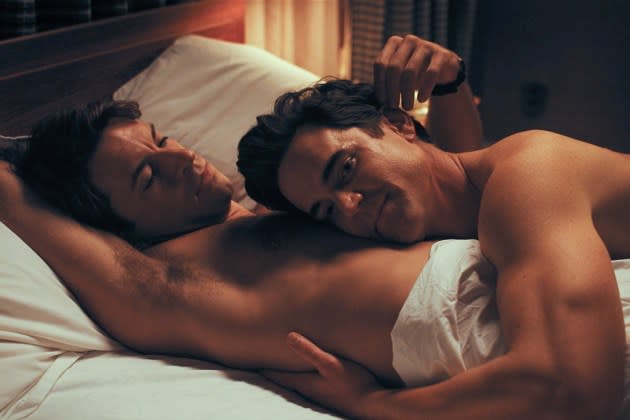
“Johnny B! Johnny B!” Matt Bomer exclaims as he logs in to Zoom to join his Fellow Travelers co-star, Jonathan Bailey, to do press for their critically acclaimed Showtime limited series.
“Hey, Matty Mo,” Bailey replies.
More from The Hollywood Reporter
How a Serbian Film About World War II Got Caught in a Modern-Day Political Crossfire
Mbongeni Ngema, Renowned South African Playwright and Creator of 'Sarafina!,' Dies at 68
The actors spent about six months filming the eight-episode series — so, of course, they’ve established a playful bond. On this particular day, they’ve even given each other nicknames.
“I don’t think I’ve ever called Matt ‘Matty Mo’ in my life,” a smiling Bailey says.
“I love Matty Mo,” Bomer replies. “Listen, I love Matty Mo. I appreciate it.”
Bomer and Bailey built a brotherhood and onscreen chemistry for the historical romantic drama about two male political staffers who fall in love at the height of the Lavender Scare, a time when homosexuals were banned from holding positions in the federal government. The series — based on Thomas Mallon’s 2007 novel of the same name — follows their intense affair into the ’80s, also visiting Vietnam War protests and the AIDS crisis.
Zoom, it turns out, is where the actors first met, reading lines together to see if there was magic. And there was.
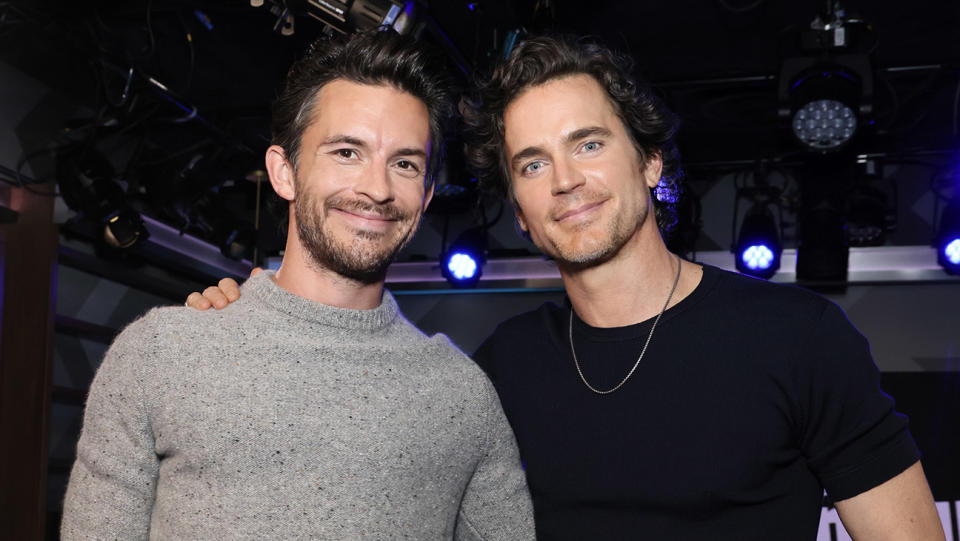
Since debuting in late October, Fellow Travelers has had an overwhelming response from viewers — some connecting directly with Bomer’s Hawkins Fuller, a veteran and State Department official who carefully hides his homosexuality, or with Bailey’s Tim Laughlin, an eager and naive congressional staffer who falls hard for Hawk. Others have identified with some of the supporting cast, including Allison Williams in the role of Hawk’s wife, Lucy Smith, and breakout stars Jelani Alladin as reporter Marcus Hooks and Noah J. Ricketts as drag performer Frankie Hines, whose gay Black love story is one of the show’s many highlights.
“It’s so nice to be able to have discourse with people who are responding to the show. That’s been really refreshing and enlightening,” says Bomer, who is also an executive producer on the series.
Bailey, best known for Bridgerton and his theater work, says he was drawn to the show because “it felt new and it hadn’t been done in this way — in an elevated, eight-hour, rich aesthetic with gay actors.
“The queer experience is so different for so many people,” he adds, “but the one thing that unites the queer experience is these moments in history.”
In an interview with THR, Bomer and Bailey talk about prepping for their roles and being gay while playing gay, while also breaking down those milk and toe-sucking scenes.
What has it been like to have people connect emotionally to the series?
MATT BOMER I won’t name names or anything, but I’ve known people over the years who’ve made similar choices that Hawk made in order to survive. Not governmentally — I mean in a society that certainly didn’t want to see them succeed. But for me, the most refreshing thing has been the young people who are really engaged in the show and knew nothing about the Lavender Scare, and are speaking to the show and the characters, but also, aspects of our history that they were unaware of that the show has — I don’t want to say taught them about, because it’s not a teaching tool — but they’ve learned about through the show.
JONATHAN BAILEY When people respond in that way and you hear their personal stories, it’s amazing that people feel that they want to share that. It’s the most grounding thing to tell a story and investigate a time or a period or a movement, that hopefully leaves an imprint on people, and/or catalyzes them to tell people and talk about their own stuff. That’s the dream, really.
Jonathan, it’s so heartbreaking to watch Tim hurting in various scenes. What were you pulling from to give such a strong emotional performance?
BAILEY Thirty-five years on this earth. (Laughs.) Drawing it from the ground. Naturally, it’s totally parts of me and parts of people that I know, experiences that you think of. Tim’s character arc is so huge, and [I wanted] to capture his youth in those early moments and then expand into what breaks such a pure, optimistic, passionate soul and all the different ways in which that could show itself. There were moments on set that you couldn’t help but be incredibly moved by.
We found ourselves filming by coincidence on World Aids Day. It is really not hard to feel the importance, but also just the grief is palpable in the stories. And there is a lineage — you inherit this in your community. It just felt like an opportunity to learn as much as I possibly could, generally, about the queer experience. We are surrounded by amazing gay men, as well. And then, of course, I’ve lived my life trying to understand the gay experience, so it wasn’t a shallow pool to [pull from].There’s a well there.
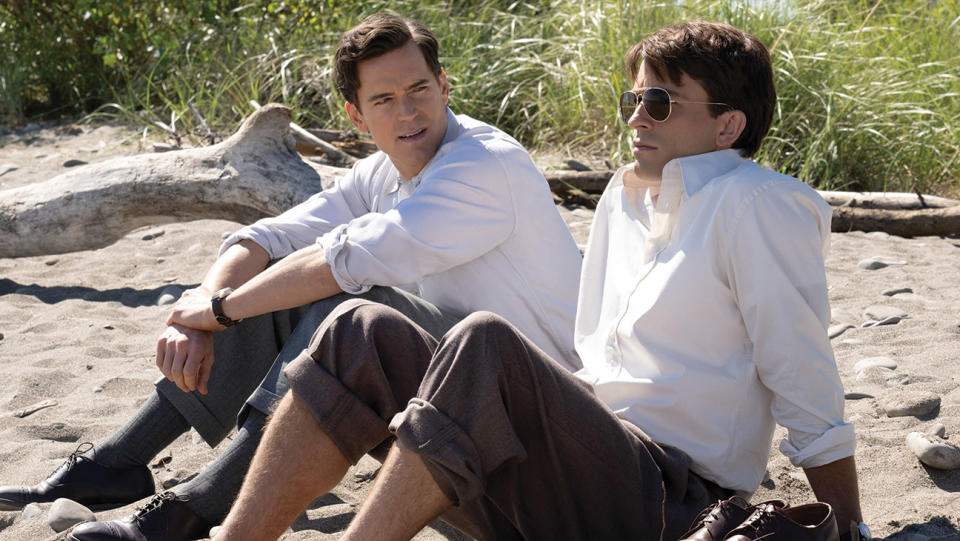
Matt, your character is so cutthroat, but obviously there’s sympathy for him, as well. What was it like playing Hawk?
BOMER Hawk does what he has to do to survive. He has his empathy and his allegiances, but anything that calls his survival into question, there are immediate and severe boundaries. But then enters Tim, who is so guileless and so full of love and all the things that Hawk wishes he could be at his core, or maybe once was before certain aspects of his life changed that or his point of view about that. You’re always looking for a shadow in your character, and it was so refreshing — he obviously has a public persona, a veneer that he presents to the world in order to maneuver in it, but he really leads with a lot of the more shadowy aspects of a typical character. It’s the love and the more open and vulnerable aspects that are his shadow in many ways. That was an interesting flip for me to get to sink my teeth into.
It’s profound to have two gay actors playing two gay characters on a TV show. Did you ever think something like this could exist?
BOMER Honestly, no. My mind has been blown so many times over the past 20 years. I’m just so grateful that the gatekeepers gave us this opportunity. I was doubtful, almost up to the 25th hour on this, that they were really going to put the money and the opportunity into this series that they did. And I’m just so grateful that people who are in the position of calling the shots gave us the chance to tell the story — and the way we needed to.
BAILEY It’s the Tims of the industry, who are searching for more, who are deconstructing, who are questioning. Because they’re all a similar peer group — [series creator] Ron [Nyswaner] knows Dante [Di Loreto, executive producer of Glee and P-Valley], who’s at Fremantle [which produced the show], and they’ve worked together for years. This isn’t something that just got commissioned
overnight, because there’s a wave of progress. The people who are really doing it, as well as the actors, are the people in positions of power who have worked their way up with these questions.
And it’s funny, the one thing I have thought over the years is — I’ve just looked at gay characters, they’re such rich, brilliant, oppressed, complicated, joyous characters to play, so of course people want to play them. And this is a brilliant example of: What better way to do a character study of two polar-opposite gay characters than have gay people play them? But that’s what I felt growing up. I just thought, “Of course people want to play those parts,” which is great. It’s just, what happens if, just for a moment, gay people play them?
And I do think that everyone can play everything, and that’s what we should be headed toward. But I do think there’s a balance that needs, and needed, addressing. And there are a lot of people whose questioning and hard work have created a world in which this can fly.
BOMER I agree with you wholeheartedly. And it is the Tims of the industry or maybe some Hawks, too, hoping for retribution.
BAILEY That’s true. We stand on the shoulders of all the Hawks, as well.
BOMER (Laughs.)
BAILEY [The Hawks] did all the work at MGM, yes. (Laughs.)
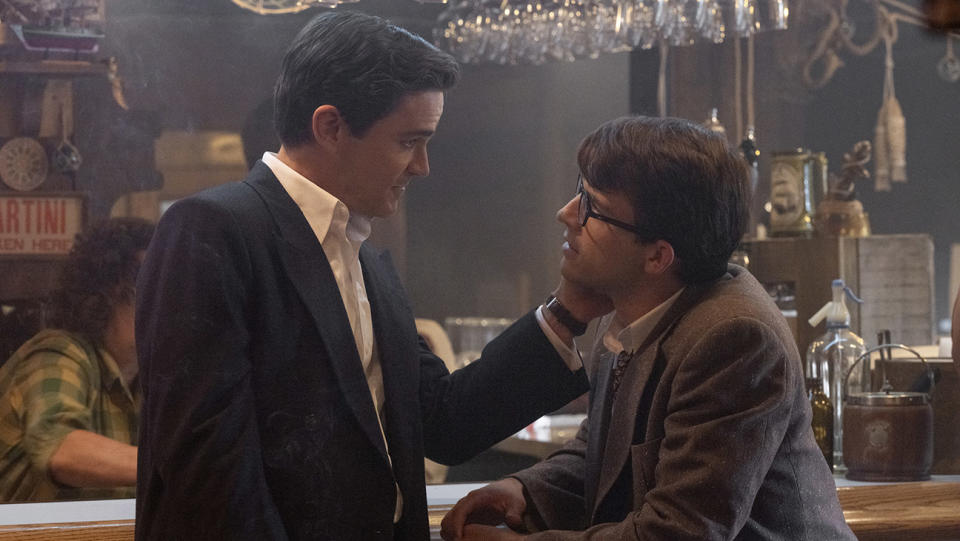
Jonathan, your character drinking milk in the series got a lot of attention.
BAILEY It was a brilliant way of showing such naiveté, and immediately you know that this is a character who’s completely outside the world Hawk inhabits, and he sees the world completely differently. He’s so open. It’s so interesting, isn’t it? Because, it’s funny that Tim leads with his heart and his openness and his childlike wonder, and his shadows are his compulsive nature of constantly needing something that he can’t fill. There’s a moment in episode six — they’re in Frankie’s flat, and I was like, “He’s got to be drinking milk.”
BOMER There was a power shift in episode eight, too.
BAILEY Exactly. The milk was on the call sheet. It’s a character in its own right. And also the milk’s character arc is more dramatic than everyone else. Give it a spinoff, I say. (Laughs.)
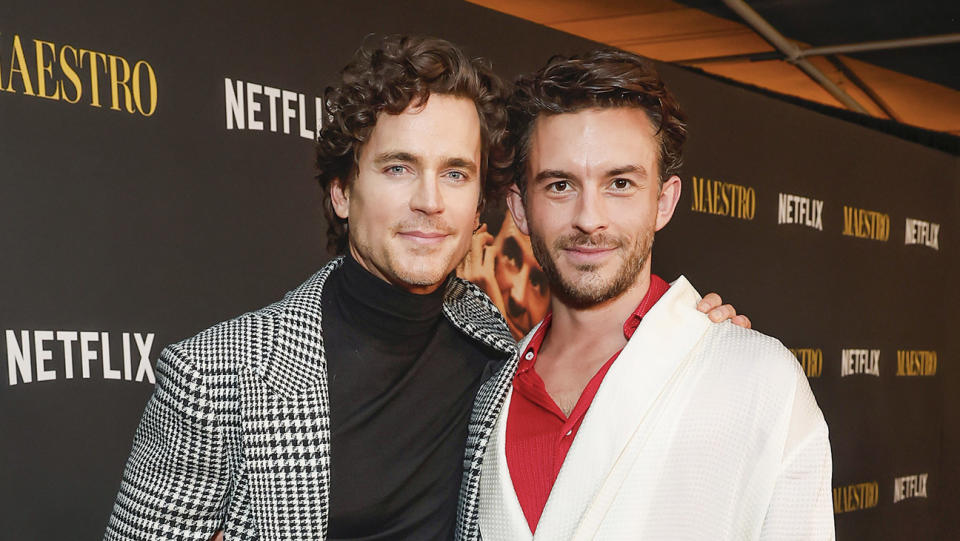
There was also that toe-sucking scene. Jonathan, did you get the script and it said “suck toe”?
BOMER Just “suck toe.” (Laughs.)
BAILEY It was very, very precisely written down — it was as precise as it needed to be. I saw that as an incredible way to dissect power. I got it when I read it, and I wasn’t intimidated by it. I was just like, “If in the first episode that’s what we are doing, it’s going to be worth five months moving to Toronto, and it’s going to be a series that I would want to watch.” Because not only is it incredibly complicated, not only is it really hot, it’s also something that masks as being provocative, but actually it’s really psychologically impactful and the people who get it get it.
BOMER I think all those scenes were a really external representation of what was going on with these characters internally, emotionally. And for me, it was really refreshing to see the gay love scenes brought to light in a really unflinching way.
BAILEY The shock and overwhelm and the tantalizing chemical combustion that happens seeing it — it’s a greater sensory experience because that’s exactly what it meant for Tim in that moment. It captures exactly what’s going on for Hawk and Tim, hopefully, allowing the viewer to experience a bodily reaction to it in the same way, whatever that may be.
This story first appeared in a December standalone issue of The Hollywood Reporter magazine. Click here to subscribe.
Best of The Hollywood Reporter

